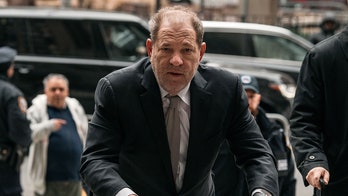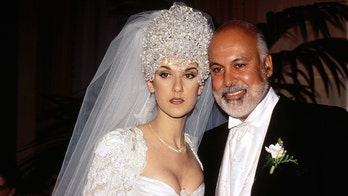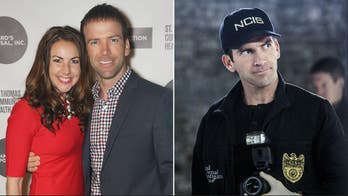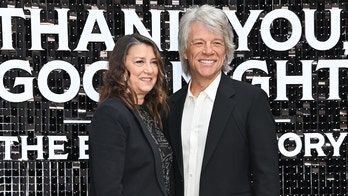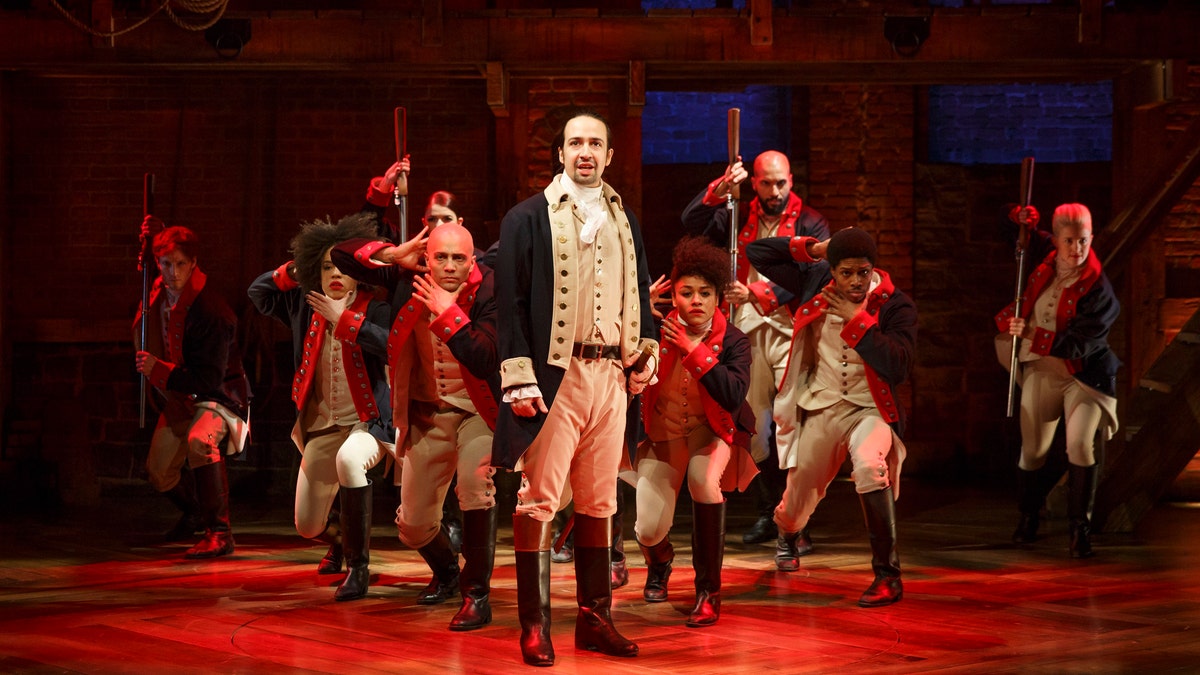
Lin-Manuel Miranda, center, performs in the musical "Hamilton" at The Public Theater in New York. (ap)
NEW YORK (AP) – It sounds screwy and yet here it is — a hip-hop-based musical on Alexander Hamilton, the first treasury secretary of the United States.
Over-hyped? Perhaps. But this almost three-hour show, with some 50 songs, reprises and song fragments — is also rollicking, messy, and earnest — just like America's founding.
The new musical reunites the team from "In the Heights" — director Thomas Kail, choreographer Andy Blankenbuehler and Lin-Manuel Miranda, who wrote the show's book, music and lyrics, and stars in the title role.
Structured chronologically and, in a brilliant stroke, narrated by Aaron Burr, the man who would kill Hamilton, the musical opened Tuesday at the Public Theater with money on it finding a bigger home at some point.
It stresses the orphan, immigrant roots of "the $10 Founding Father without a father," his vices and ambition, and his almost Greek tragedy of a death. It's clever and ambitious, yes, and also in need of some editing.
It's the kind of show that Broadway insiders are already applauding: Edgy without being scary, historical without being dry. It's hip-hop with a master's degree. Could it be the thing that rescues Broadway?
It's true that Miranda seems to be one of those unique artists who manages to mashup disparate worlds. He's fluent in Sondheim and Tupac, and has a sly, smart sensibility. He's like that cool-nerd slouched in the front row of AP History class with his hand permanently in the air. But there's a danger here of putting too much on an already overstuffed "Hamilton."
The Public Theater even tries to equate Miranda's embrace of common speech with Shakespeare's in its program note. Really? Will generations really celebrate the rhyming of mello and Monticello? Or quote Hamilton to John Madison? "Hey, turn around, bend over, I'll show you where my shoe fits."
The standout performances are Leslie Odom Jr. as Burr; Phillipa Soo as Hamilton's wife; Renee Elise Goldsberry as Hamilton's sister-in-law; and Daveed Diggs as a sarcastic Thomas Jefferson (his Marquis de Lafayette in Act One isn't as strong).
And Brian d'Arcy James, as a foppish and peevish King George, sings three songs to his former American colonies like a jilted lover — "You'll be back," he croons — and will have you crying with laughter.
The show is inspired by a Ron Chernow biography — the historian actually gets a bio in the Playbill — yet is filtered through Miranda's cultural and musical world.
And what a world that is: The songs range from breezy pop to rap battles to gospel to sexy R&B. Hip-hop fans will hear shards of lyrics by Notorious B.I.G., Lauryn Hill and LL Cool J, like little Easter eggs. The sparse wooden-and-rope set by David Korins has a revolving center, which, if you think about it, is a perfectly appropriate turntable.
The audience will get a tremendous amount of information about Hamilton. Did you know he had a thing for his sister-in-law? And they'll also get too much about the smaller moments in American history. The Whiskey Rebellion, anyone? The Battle of Monmouth?
When everything works, it's thrilling to watch. "The Room Where It Happened" is a real feat of choreography, performance and stagecraft, led by Odom, who is an anguished, multi-dimensional Burr. "The Duel Commandments" is a clever riff from the Notorious B.I.G's "Ten Crack Commandments," and "Satisfied" is a "Rashomon" love moment led by a glorious Goldsberry.
Miranda and Kail clearly know when to go big but also when to bring it down. Soo's song "Burn" is a heartfelt ballad with the only special effects being real flames. But the final duel pitting Burr and Hamilton has both men with guns drawn, dancers spinning, the stage turning — it's like a John Woo film.
But so much churning also creates a series of stuttering Act One would-be closers, unnecessary tunes like "One Last Ride" and one that was oddly marooned: "Hurricane," with new information about Hamilton's childhood, sounds like a tent-pole number but curiously ends up at the three-quarter mark.
"Hamilton" is nothing less than a reclaiming of America's founding story, a retelling of the 18th century story by a nontraditional cast wearing vests and cravats and singing about "dropping knowledge."
In its own way, it's a revolution, all right.
